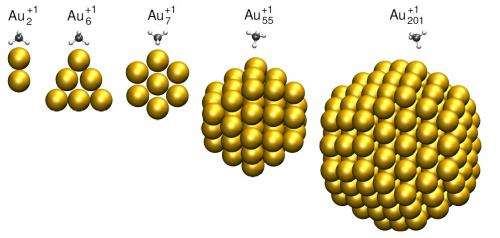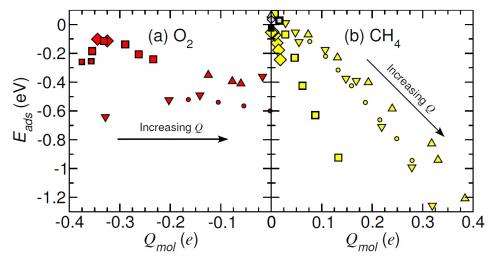September 16, 2013 feature
Delicate oxidation can transform greenhouse gas into useful chemicals

(Phys.org) —Methane is the main component of natural gas, as well as a potent greenhouse gas whose levels in the atmosphere have been rising. In a new study, scientists have investigated a way to transform methane into more valuable and useful chemicals by partially oxidizing methane in a "delicate" way—that is, at low temperatures, low pressures, and by controlled means. This ability requires understanding how the catalytic activity of nanoparticles can be controlled and manipulated, which is currently a major challenge in nanoscience.
The researchers, led by Dr. Duncan J. Mowbray, Dr. Annapaola Migani, and Professor Angel Rubio at the University of País Vasco in San Sebastián, Spain, have published their paper on the delicate oxidation of methane on gold nanoparticles in a recent issue of The Journal of Physical Chemistry Letters.
"The partial oxidation of methane is important for a number of reasons," Mowbray told Phys.org. "Methane is one of the worst greenhouse gases. For example, one cubic meter of methane has the same environmental impact as 30 cubic meters of carbon dioxide.[1] Methane is also produced in large quantities, both naturally through biological processes within humans and animals, and as a by-product of oil refining. In fact, as methane is so environmentally unfriendly and requires specialized infrastructure to transport, tens of billions of cubic meters are flared by the petroleum industry into carbon dioxide each year.[2] If one could instead produce something useful from the methane, e.g. through its partial oxidation, it would have an exceedingly positive environmental and economic impact."
So far, only a few studies have investigated the interaction between methane and gold. These studies have experimentally demonstrated that methane can adsorb (or adhere) to gold nanoparticles, but the underlying mechanism is not well understood. Since methane is a noble gas, its adsorption on metals is usually weak. For this reason, previous studies assumed that methane adsorption is dissociative, meaning that the methane molecules (CH4) split into two molecules (e.g,, CH3 and H) when adsorbing on the gold nanoparticles.

But the scientists in the current study have found that such a reaction would require too much energy to overcome the energy barrier for methane to adsorb on gold nanoparticles.
Instead, the scientists show that methane adsorbs on gold nanoparticles only when the gold nanoparticles are positively charged, and that the adsorption can be explained by charge transfer. Even more interestingly, they found that as the total charge of the gold nanoparticles increases, the more strongly the methane binds to the gold nanoparticles. Specifically, the researchers observed a linear relation between the gold charge and the methane adsorption.
While methane adsorption depends on the gold charge, oxygen adsorption does not, so tuning the gold charge provides a way for researchers to independently tune the methane absorption. By making the methane adsorb approximately three orders of magnitude more strongly than the oxygen, the researchers could perform delicate methane oxidation on gold at low temperatures and pressures, which is a requirement for many environmental and economic applications such as producing useful chemicals.
"Methanol, ethylene, and formaldehyde are just some of the important chemicals that can be produced directly by partially oxidizing methane," Mowbray said. "Methanol is especially important, as it is a green fuel alternative for motor vehicles.[2] However, almost all methanol produced is used to make formaldehyde. So a direct pathway from methane to methanol or formaldehyde is environmentally and economically vital."
The researchers also formulated two models to predict methane adsorption energies on charged gold nanoparticles, which show that the mechanism holds for gold nanoparticles with sizes ranging from two atoms to 200 atoms. In the future, the scientists hope that these models will guide further research in this area. The next step for the researchers is to demonstrate these ideas experimentally.
More information: Duncan J. Mowbray, et al. "Gold and Methane: A Noble Combination for Delicate Oxidation." The Journal of Physical Chemistry Letters." DOI: 10.1021/jz401553p
[1] Vladimir S. Arutyunov "Recent Results on Fast Flow Gas-Phase Partial Oxidation of Lower Alkanes", J. Nat. Gas Chem. 13(1) 10-22 (2004).
[2] V. S. Arutyunov, V. I. Savchenko, V. M. Rudakov, V. N. Blinichev, and A. M. Kutepov "Methanol Synthesis by Direct Oxidation of Natural Gas at Thermal Power Plants", Theor. Found. Chem. Eng. 36(4) 382-388 (2002).
Journal information: Journal of Physical Chemistry Letters
© 2013 Phys.org. All rights reserved.




















